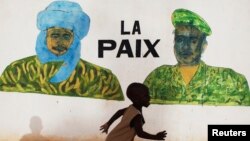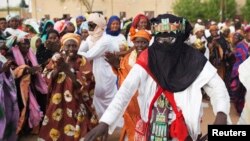BAMAKO —
Kidal counts less than 1 percent of the country's registered voters but, as the home turf of the rebellion, it boasts more than its fair share of symbolism in this election.
Malians rank peace and stability as top priorities for the country's next president. They go to the polls Sunday amid tensions in the far northern town of Kidal. It has been occupied by the Tuareg separatist group, the MNLA, since a French-led military intervention against jihadist groups in northern Mali began in January.
What to do about Kidal?
Mali's 27 presidential candidates have tried to strike a delicate balance, pledging to get tough on the country's vast security challenges while fostering reconciliation.
The lone female candidate in the race is a National Assembly deputy from the northern town of Bourem. She has been an outspoken critic of the MNLA rebellion.
Aichata Chada Haidara said she is not against dialogue, but that "we need a dialogue" that includes all Malians. "If we don't find a solution through dialogue, we must use force, " she said, " and I think I have shown that I would be able to fix this problem by dialogue and if that doesn't work, by force."
Candidate Ibrahim Boubacar Keita was the first of four frontrunners to make a campaign stop in Kidal, the bastion of the Tuareg rebellion, 1,600 kilometers from the capital, Bamako.
Kidal counts less than 1 percent of the country's registered voters but, as the home turf of the rebellion, it boasts more than its fair share of symbolism in this election.
In Kidal, Keita said these divisions have torn Mali apart and it is time to mend.
Keita said he will work to return Mali to the state of brotherhood and solidarity that it has always been. "We need to put the country back together and God willing, I say I will do it and so I will," he said.
The latest top candidate to visit Kidal, Soumaila Cisse, said Wednesday he was there to highlight the need to rebuild Mali as "one and indivisible."
Voting will take place in Kidal following a makeshift provisional accord signed between rebels and the government on June 18. The agreement called a cease-fire for the elections and allowed some Malian troops and administrators to return to the rebel stronghold.
Tensions, however, are running high and have led to bursts of violence. Six election workers were kidnapped and later freed.
The government mediator for the June agreement, Tiebele Drame, was a presidential candidate until he pulled out, saying the country, and in particular Kidal, are not ready for this election.
This is the fourth time Tuareg rebels have fought for independence since 1960. Previous rebellions have ended in peace accords and unkept promises.
But this most recent rebellion, launched in January 2012, sent the country tumbling into a nationwide crisis marked by a military coup in the south followed by an Islamist takeover of the north. Mali, once called one of Africa's most stable democracies, was being compared to Afghanistan and Somalia.
Voters say the pressure is on for the next president to solve the problem once and for all.
A street seller from the northern town of Gao, Mamadou Maiga, said all these problems need to end and that when he thinks about the north, he cannot sleep at night. "I can't even hear the word rebellion anymore. Enough is enough," he said.
An MNLA spokesman told VOA that they are ready for negotiations with the new government, once in place, but declined to say what their demands will be, saying just that they are entering talks with an open mind.





